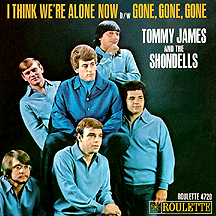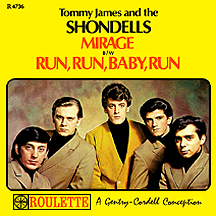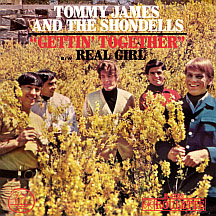TOMMY JAMES AND
THE SHONDELLS
Just about every young guy wants to be in a rock band at some point in his life. It was that way for me, but my experience was limited to a couple of amateur jam sessions at a friend's house before realizing our personality clashes and lack of musical talent probably wouldn't take us far. Tom Jackson had the same idea in 1959, when he was 12 years old, and determination kept him going as he followed his dream for years with only limited results...until a series of fateful occurrences led the way to late-'60s stardom.
Tom's family had moved from Dayton, Ohio to the small town of Niles, Michigan, and his first band of preteens called themselves The Echoes (predating Brooklyn's doo wop Echoes by a couple of years). By 1962 the group was a little better organized, with guitarists Jackson and Larry Coverdale fronting The Tornadoes (close to the time bands from Los Angeles and Britain emerged with the same name). Working at a record store in Niles, he made a connection many would sell their priceless family heirlooms for: an opportunity to cut a record. "Long Pony Tail" (a song originated by Chuck Tharp and the Fireballs in 1959) possessed a crude rockabilly sound; credited to Tom and the Tornadoes, it was recorded and pressed on the nowheresville Northway Sound label. At the very least, it gave them a certain legitimacy; here was a real 45 the band could sell at shows where they performed.
Rising young songwriters Jeff Barry and Ellie Greenwich started making their mark in 1962 and '63, scoring several hits, mainly through a fortunate affiliation with producer Phil Spector. The married couple also recorded in a girl group style as The Raindrops; the flip side of their third single, "That Boy John" in late '63, was a quickly-thrown-together ditty called "Hanky Panky." Jackson's group had once again switched monikers by 1964, this time going by The Shondells (a name already in use by a King Records girl group they must not have been aware of) and had settled into a lineup consisting of Jackson, Coverdale, bassist Larry Wright, keyboard player Craig Villeneuve and drummer Jim Payne.
After releasing another regional single, "Pretty Little Redbird" on the local Snap label, they saw another area band performing "Hanky Panky" and decided to do their own version. Jack Douglas, a disc jockey at local station WNIL, produced (I use the term loosely) a rough-edged recording by the band (with improvised lyrics, as Tom didn't know the song that well) along with Coverdale's driving, no-nonsense surf instrumental "Thunderbolt." Issued as the second Snap single, "Hanky-Panky" (a hyphen was added to the title) received a fair amount of airplay in the Great Lakes region but Douglas was unable to set up national distribution for the record. With that the Shondells hit a wall, and most of the guys drifted away. Jackson and Coverdale started a new band, The Koachmen, but nothing much happened besides a handful of nearby club and concert dates. A married man and father by early 1966, Tom Jackson was ready to throw in the towel and get a "regular" job.
The story might have ended right there if a dance deejay in Pittsburgh hadn't found a copy of "Hanky-Panky" and begun spinning it at his gigs. The record started getting radio play there and the Red Fox label (the company that had earlier distributed the Snap singles) pressed up copies without checking to see if they still had the right to do so. Tom contacted the other Shondells but not one was in a position to rejoin, all having mortgaged up their lives (to quote The Rolling Stones from "Sittin' on a Fence"). Moving to Pittsburgh temporarily, he found a five man outfit called The Raconteurs playing at a club and approached them about becoming his band; they of course said yes and were christened the new Shondells on the spot. Guitarist Joe Kessler, saxophonist George Magura and drummer Vinnie Pietropaoli were only with the band a short time, though. The other Raconteurs, bassist Mike Vale and keyboard player Ronnie Rosman, were joined by guitarist Eddie Gray and drummer Peter Lucia. Jackson changed his name to Tommy James and the band was ready to capitalize.
The master was sold to Roulette Records and Tommy, surprised the company's executives didn't want the group to rerecord the song, later realized the raw and somewhat amateurish feel of the one-take recording worked in its favor. "Hanky Panky," shown on the new label as Tommy James and the Shondells, hit the national charts in June '66 and seized the number one spot the following month, giving increased hope to all the isolated rock rebels across America that they too could have a hit record! He relocated to New York City and hooked up with Ritchie Cordell and Bo Gentry, already established as producers and session players. Follow-up singles "Say I Am (What I Am)" (a remake of "What I Am," a Fireballs tune from earlier in the year) and "It's Only Love" (written by Cordell with Sal Trimachi and Morris Levy) were top 40 hits, decent enough in sales and airplay, but fleeting enough to make Tommy a little nervous about future possibilities.
Ritchie Cordell penned the next four singles, starting with "I Think We're Alone Now," a skillfully-written piece with some well-timed sound effects and lyrics just risque enough to get people talking; it returned the group to the top ten in April 1967 and put them into a pop-song bag, at least for awhile. "Mirage" was created when Bo Gentry accidentally played the master tape of "I Think We're Alone Now" backwards; intrigued by the sound of the reverse chord progression, they built the song around it and scored another top ten in June. "I Like the Way" and "Gettin' Together" were solid hits, if a bit lacking in adventurous spirit, but "Out of the Blue" and "Get Out Now," both Cordell-Gentry songs, peaked mid-chart and Tommy found himself repeating the cycle of the previous year. He needed to come up with a big hit in '68.
"Mony Mony" was a collaboration of four songwriters: Cordell, Gentry, Bobby Bloom (the "Montego Bay" man) and Tommy James. The missing ingredient was the title, which Tommy came up with after noticing a sign for the Mutual of New York insurance company outside the window of his Big Apple apartment; the nonsensical "MONY" shout was a good fit for the simple but energetic production, recorded with a lot of people in the studio to give it a live party feel. Chalk it up as the fourth top ten smash for Tommy and the Shondells, June '68. Hits "Somebody Cares" and "Do Something To Me" (reenergizing a ? and the Mysterians tune from a year earlier) rounded out the year's hit list while James focused on supporting Hubert Humphrey during his campaign for the presidency (which he lost to incumbent Richard M. Nixon).
Tommy wanted to take more control of his music. In late '68 he started producing, arranging, writing (with input from the Shondells) and even taking part in marketing the music; eventually he would go solo, writing songs with Bob King, while the other group members went together in a separate direction. In 1969, though, they were all working together in hallucinogenic harmony...that is, as long as James called all the shots (Roulette bosses were willing to steer clear as long as the hits kept coming). "Crimson and Clover" was heavy on experimental effects (the bizarre vocals heard near the end of the song were achieved by running the microphone through a guitar amplifier, using the tremolo for a rippling sound; it caused a lot of people to think radio reception was poor and react by trying to adjust their radios). This one-of-a-kind single hit number one in February. Humphrey, close friends with James after some three months on the road together during his campaign, wrote the liner notes for the group's "Crimson and Clover" album.
Tommy retained his "trippy" techniques for the next two '69 singles, "Sweet Cherry Wine" and "Crystal Blue Persuasion." With Mike Vale, he wrote "Sugar on Sunday," a hit that summer or The Clique on the White Whale label; it sounded so much like a Tommy James and the Shondells record that many were convinced the band was pulling a Beatlesque bait-and-switch. "Ball of Fire" and "She" led the way into 1970, then an exhausted and possibly drug-affected James collapsed at a concert stop in Birmingham, Alabama. After several weeks in a hospital spent recuperating, he decided to quit the business, bought a farm in upstate New York, and dropped out. But that idea didn't hold up for very long. Within a month or two he was making regular excursions to the big city to work on his comeback sans Shondells.
Tommy went into the studio to record "Tighter, Tighter," a song he and Bob King had written, but he froze in front of the microphone. Realizing it wasn't going to be that easy to get back into the swing of things, he instead produced the track, with King, for New York group Alive and Kicking, who took it to the top ten in the summer of '70. Tommy gradually regained confidence and got things rolling with "Ball and Chain," his first solo single, at summer's end. Shondells regulars Vale, Rosman, Gray and Lucia formed Hog Heaven and hit the charts in April 1971 with "Happy." In July, "Draggin' the Line" marked the first and only top ten hit for the newly liberated Tommy James, though he continued making records for Roulette, in spite of the label's alleged mob ties, for a few more years. In 1980, he appeared on the Millenium label and enjoyed one final radio hit, "Three Times in Love." He's been spreading the love and performing his hits (occasionally joined by one or two original Shondells) ever since.
NOTABLE SINGLES:
- Long Pony Tail - 1962
as Tom and the Tornadoes - Pretty Little Redbird - 1964
as the Shondells - Hanky-Panky - 1964
as the Shondells - Hanky Panky /
Thunderbolt - 1966 - Say I Am (What I Am) - 1966
- It's Only Love - 1966
- I Think We're Alone Now - 1967
- Mirage - 1967
- I Like the Way - 1967
- Gettin' Together - 1967
- Out of the Blue - 1967
- Get Out Now - 1968
- Mony Mony - 1968
- Somebody Cares - 1968
- Do Something To Me - 1968
- Crimson and Clover - 1969
- Sweet Cherry Wine - 1969
- Crystal Blue Persuasion - 1969
- Ball of Fire - 1969
- She - 1969
- Gotta Get Back To You - 1970
- Come To Me - 1970
- Ball and Chain - 1970
by Tommy James - Happy - 1971
by Hog Heaven - Draggin' the Line - 1971
by Tommy James - I'm Comin' Home - 1971
by Tommy James - Nothing to Hide - 1971
by Tommy James - Three Times in Love - 1980
by Tommy James




